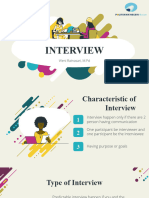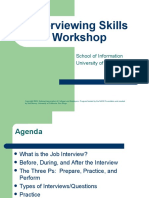Interview Prep Guide
Uploaded by
ramit987studyInterview Prep Guide
Uploaded by
ramit987study*There are many different questions that an interviewer would ask you during a behavioral
interview. In order to prepare, you should write out answers in bullet-point form to each of
these questions, memorize the main points of your answers, and practice saying them over and
over again before your interview. These are some of the ones that are encountered most often
by candidates, but this is not a comprehensive list!*
1. Tell me about yourself.
a. Answer this: 1) Who You Are - your year, school, field of study, passion, 2) What
You’ve Done - your previous roles, accomplishments in those roles, and skills you
learned, and 3) Why You’re Interviewing - why you want this next position, why you
would be a good fit, what you could bring to this new role, and what you could learn
from it.
2. Tell me about a time where you messed up/a weakness of yours and how you corrected it.
a. Don’t choose a fake weakness here, and don’t choose a weakness that is actually
something you need to be really good at for the internship you’re interviewing for!
Choose something that you can tell a story about that will show an arc of learning and
growth in a tangible way.
3. Tell me about your strengths.
a. This isn’t just a free opportunity to brag! Pick strengths to discuss that directly
pertain to the role you are interviewing for, and that will help you stand out amongst
other applicants.
4. Tell me about a time when you solved a problem/handled a challenging situation.
a. This is an opportunity to show your process of dealing with conflict. How did you
assess the situation? Were you calm under pressure? Who did you collaborate with to
solve it? How did you create your solution? Show that you have a process for
addressing issues.
5. Tell me about a time where you achieved something at work or in school that you are most
proud of.
a. You can get creative with this question more than any other question! While some
people take the opportunity to answer this question with a work accomplishment
that’s on their resume, some choose a more personal accomplishment that can tell an
interviewer more about their values.
6. Give me an example of a time when you had to think on your feet.
a. This question is mainly meant to assess your creativity and your willingness to try
new things when faced with surprises! Show that you know how to adapt, can handle
pressure, and are creative when it comes to problem-solving!
7. Tell me about a time you set a goal for yourself. How did you go about ensuring that you
would meet your objective?
a. This question is often testing our ability to strategize, create timelines, collaborate,
communicate, and overcome barriers. Keep this in mind as you’re thinking up your
answer to this question!
8. Give me an example of a time when you had to handle multiple responsibilities at once. How
did you prioritize your time?
a. This question asks for your technical skills - such as using a calendar, being an
effective communicator - as well as how you divide your time and decide what to
prioritize. What makes a task important to you? This depends based on your field.
9. Tell me about how you work under pressure.
a. Are you the kind of person who becomes miserable to work with when you have a lot
on your shoulders, or do you use intentional strategies and processes to navigate
high-pressure situations? They want to see that you are someone they can trust to be a
stable force when things inevitably might get a little rocky!
10. Why did you apply to this position, and why this company/organization?
a. DO. YOUR. RESEARCH. Show that you have done your best to understand the
history of the company, as well as current company-wide and team-specific goals.
What are some values of the company you align with? What public projects are they
doing that interest you? What kind of learning opportunity does this one provide that
others don’t?
The STAR method is helpful when it comes to answering interview questions. STAR stands
for:
- Situation: set the scene and give the necessary details of your example.
- Task: what were you responsible for at that moment to do?
- Action: what were the steps that you took to address the situation at hand?
- Result: what were the outcomes that you achieved/solution you created?
Using this format when answering “tell me about…” or “give me an example of…” questions
will help your interviewer see your real-world experience handling different circumstances in
the workplace!
Feel free to make a copy of this document to use for your interview prep! XO, Internship Girl
(Follow me on TikTok + Instagram)
You might also like
- 35 Behavioral Interview Questions To Prepare For (With Example Answers)100% (1)35 Behavioral Interview Questions To Prepare For (With Example Answers)7 pages
- Dutch Vision On (Youth) Football Development100% (10)Dutch Vision On (Youth) Football Development42 pages
- 26 Most Popular Interview Questions and Answers - Compiled For FreshersNo ratings yet26 Most Popular Interview Questions and Answers - Compiled For Freshers7 pages
- Get That Job: Interviews: How to keep your head and land your ideal jobFrom EverandGet That Job: Interviews: How to keep your head and land your ideal jobNo ratings yet
- How To Prepare To Hit The Mark On Your Interview: Step 3: Practice Makes PerfectNo ratings yetHow To Prepare To Hit The Mark On Your Interview: Step 3: Practice Makes Perfect35 pages
- LinkedIn Job Interview Prep Booklet PDFNo ratings yetLinkedIn Job Interview Prep Booklet PDF20 pages
- Interview Preparation: Compiled and Prepared By: Nur Ain Syafiqah Binti Abdul HalimNo ratings yetInterview Preparation: Compiled and Prepared By: Nur Ain Syafiqah Binti Abdul Halim10 pages
- Prof. M. A. Tamboli: PIRENS Technical Campus, Loni Bk. Mob: 9766010560No ratings yetProf. M. A. Tamboli: PIRENS Technical Campus, Loni Bk. Mob: 976601056060 pages
- Your Guide To Interview Questions: UD Career ServicesNo ratings yetYour Guide To Interview Questions: UD Career Services7 pages
- Mock Interview - Sample Question List: Sample General Interview Questions (Pick 5 - at Least One From Each Section)No ratings yetMock Interview - Sample Question List: Sample General Interview Questions (Pick 5 - at Least One From Each Section)3 pages
- STAR Method For Selling Yourself in InterviewsNo ratings yetSTAR Method For Selling Yourself in Interviews3 pages
- 30 Common Behavioral Interview Questions to Prep for | the MuseNo ratings yet30 Common Behavioral Interview Questions to Prep for | the Muse23 pages
- For The Interview. Questions of Introducing. 1) Tell Me About YourselfNo ratings yetFor The Interview. Questions of Introducing. 1) Tell Me About Yourself3 pages
- Interview Preparation: Compiled and Prepared byNo ratings yetInterview Preparation: Compiled and Prepared by10 pages
- Using The STAR Method For Your Next Behavioral inNo ratings yetUsing The STAR Method For Your Next Behavioral in1 page
- Interviewing Skills Workshop: School of Information University of MichiganNo ratings yetInterviewing Skills Workshop: School of Information University of Michigan30 pages
- 45+ Behavioral Interview Questions in 2024 (+ Sample Answers)No ratings yet45+ Behavioral Interview Questions in 2024 (+ Sample Answers)49 pages
- SCS - Preparing For An Interview Fall 2022No ratings yetSCS - Preparing For An Interview Fall 202237 pages
- Interviewing: The Information in This Section Will Supplement The Materials Handed Out During The Interviewing WorkshopNo ratings yetInterviewing: The Information in This Section Will Supplement The Materials Handed Out During The Interviewing Workshop17 pages
- Successful Interview Tips: Engineers Job Fair 2015No ratings yetSuccessful Interview Tips: Engineers Job Fair 201512 pages
- Job Interview: The Most Common Questions and Answers during a Job ApplicationFrom EverandJob Interview: The Most Common Questions and Answers during a Job Application5/5 (3)
- Sample Open Ended and Behaviour Based Interview QuestionsNo ratings yetSample Open Ended and Behaviour Based Interview Questions2 pages
- Analysis and Redesign of The Existing Campus Network: A Case StudyNo ratings yetAnalysis and Redesign of The Existing Campus Network: A Case Study12 pages
- Module in Biologica L Sciences: Sibonga Community CollegeNo ratings yetModule in Biologica L Sciences: Sibonga Community College13 pages
- Sample Paper - 2010 Class - IX Subject - Mathematics: X X X X A BNo ratings yetSample Paper - 2010 Class - IX Subject - Mathematics: X X X X A B6 pages
- BA Part-III Assignment Question For Examination-2024No ratings yetBA Part-III Assignment Question For Examination-202410 pages
- A Step-by-Step Guide in Answering Comparative Analysis Questions For GCSENo ratings yetA Step-by-Step Guide in Answering Comparative Analysis Questions For GCSE2 pages
- Mission Paricharika Sample PDF Missionnursing - inNo ratings yetMission Paricharika Sample PDF Missionnursing - in121 pages
- Catch-Up Fridays - January 12, 2024 ActivitiesNo ratings yetCatch-Up Fridays - January 12, 2024 Activities4 pages
- Accreditation: Accordance With Licensure Requirements, Laws, and Rules and RegulationNo ratings yetAccreditation: Accordance With Licensure Requirements, Laws, and Rules and Regulation2 pages
- Vmware NSX-T Data Center: Design: © 2019 Vmware Inc. All Rights ReservedNo ratings yetVmware NSX-T Data Center: Design: © 2019 Vmware Inc. All Rights Reserved13 pages

























































































